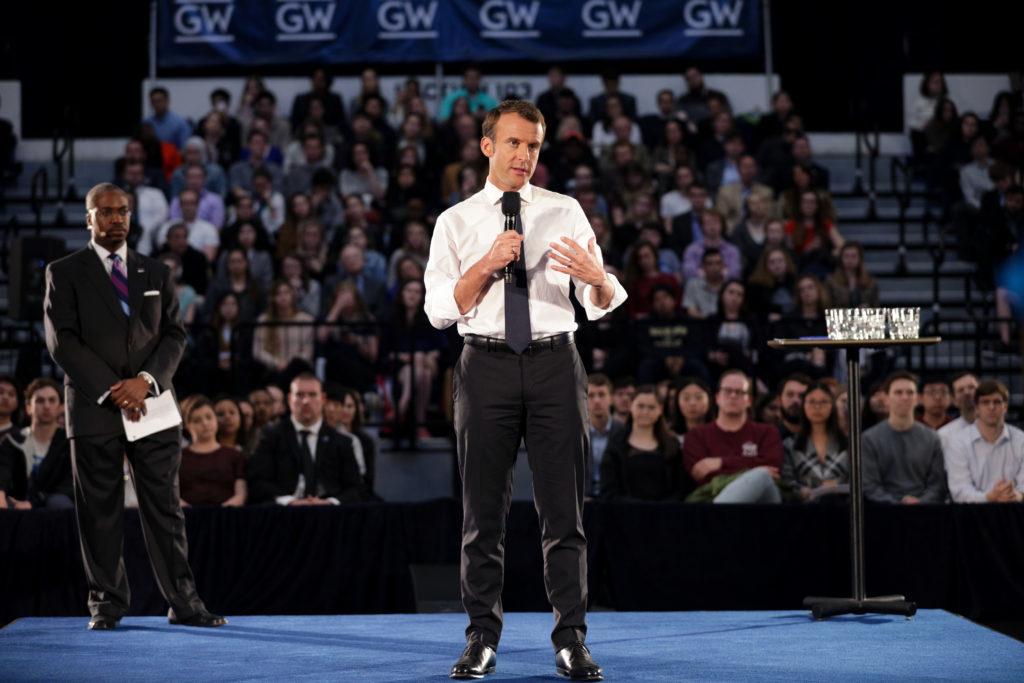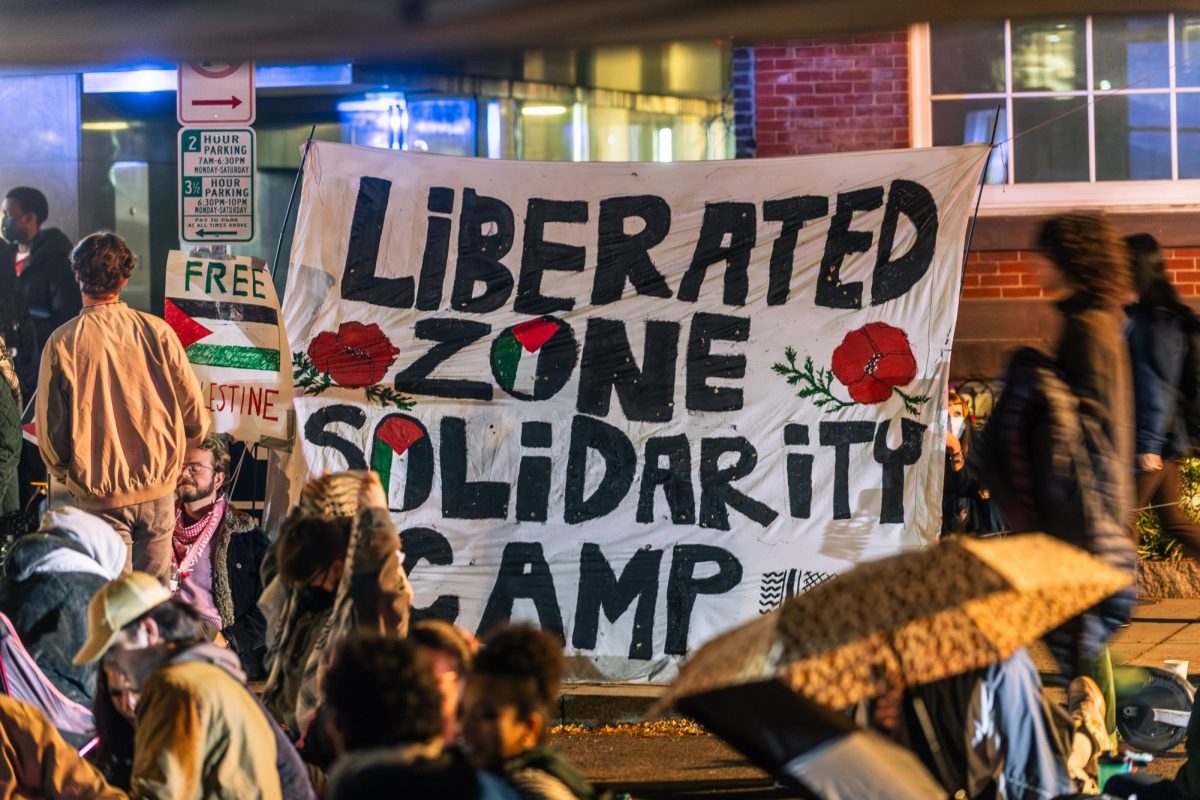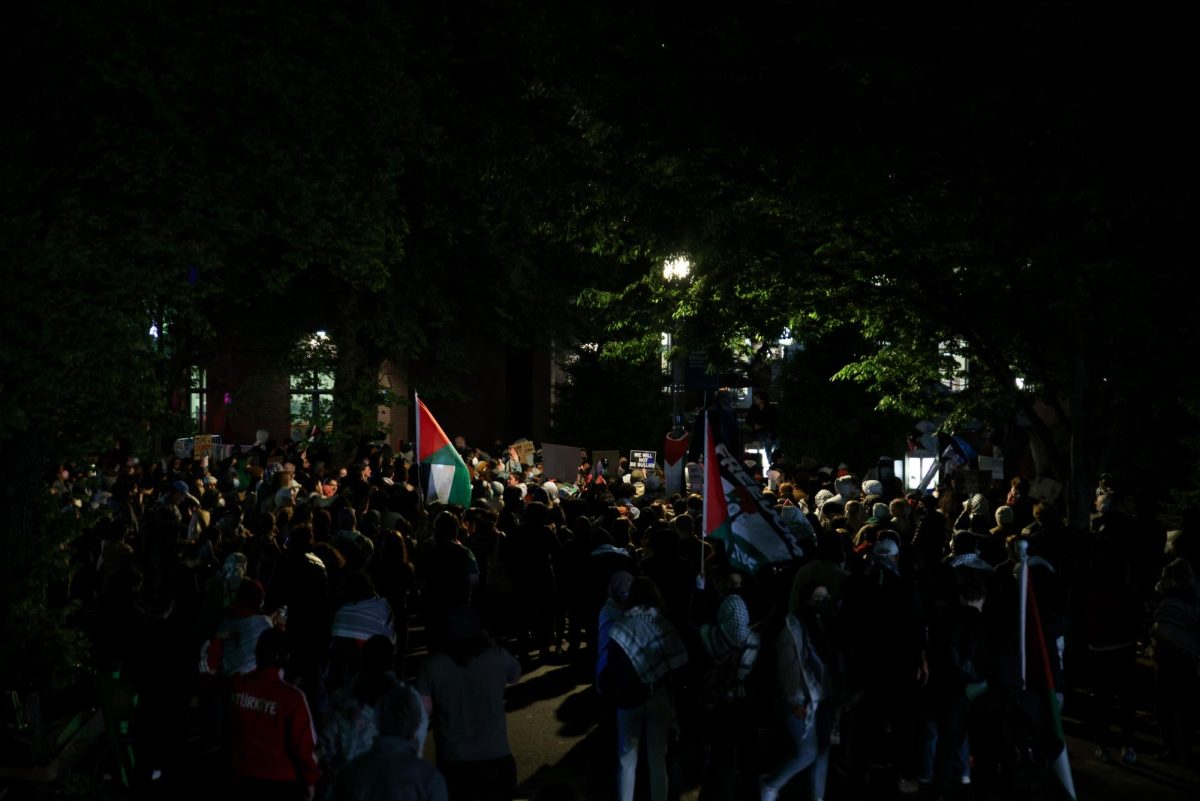The president of France fielded questions from students at a town hall in the Smith Center Wednesday during his inaugural visit to the United States.
Before heading to GW, Emmanuel Macron – who was elected as the youngest president of France last year – visited President Donald Trump for a state dinner and spoke before a joint session of Congress about international issues, like the Paris Climate Accord.
Macron responded to a range of questions at the town hall, like what it was like to meet the Dalai Lama, how to expand the French language around the world and his response to railway worker strikes in France. Shortly after his talk, Macron held a press conference in the Marvin Center, where he discussed international politics and the importance of preserving the Iran nuclear deal.
In case you weren’t one of the 1,000 students who won a lottery ticket to attend the talk, here are some highlights:
1. The war in Syria
Before arriving at the Smith Center, Macron ate at Tonic Restaurant, where students lined the streets to protest recent airstrikes against the Assad regime in Syria. Macron said he sympathized with the protestors but that the strikes were in response to terrorist attacks in the western world.
“I told them, ‘I’m with you – I’m against war in Syria,'” he said. “But we have to be precise and perfectly understand where we are in Syria and what we do.”
Macron said his position is similar to the one President Donald Trump has taken on the conflict – that attacks on Syria can end once terrorists are finally defeated. He said Trump’s willingness to pursue a peaceful solution to the conflict is encouraging.
“Our first challenge in Syria is not about war. It’s to win peace,” Macron said. “It’s to build an inclusive state, to be sure that all the minorities, all the people in Syria will be entitled to leave, express themselves and vote.”
2. Religion and race in France
Macron spoke about rising instances of attacks on Jewish people in France, calling the trend a resurgence of anti-Semitism exacerbated by the divisive Israel-Palestine conflict.
The solution to the problem, Macron said, is to fortify Jewish communities, educate students in school about religious tolerance and reaffirm a vision of French society that includes Jewish people as vital members of society.
“We have to protect our Jewish people and reaffirm every day that they are part of the French Republic,” he said. “I often say that the French Republic would not be the same without Jewish people.”
Macron then turned to immigration policy and crime rates in France. He said one way to reduce the level of crime in the country is to provide a quality education to the children of migrants, so that they can find job opportunities in French society.
“On education, that’s something we decided to reduce like crazy the number of children in classrooms, especially in poor neighborhoods,” he said. “That’s one of the best options to fix this issue and to show them you have to be educated. It will allow you to find your place in society.”
3. The future of the European Union
In the aftermath of Britain’s vote to leave the European Union in 2016, Macron talked about the benefits of the intergovernmental organization. He said complex problems facing Europe — including privacy rights, attracting innovation and climate change — could be handled through the EU.
“I do believe that given the current challenges we have, the European Union is the best way to organize ourselves and deal with these challenges,” he said.
The French president said a single nation attempting to solve these multinational problems would run into roadblocks.
“It’s much more efficient to have it organized at the EU level,” Macron said. “I hope in the coming months we can reach an agreement on that.”
The stability the EU provides Europe, Macron said, was also an indispensable resource for the continent.
“If you look at Europe, look at our history for centuries and centuries,” he said. “During the past centuries we always experienced wars, I mean almost every decade. That’s the first time, during 70 years, we didn’t get any wars. This is a unique integration.”
4. Climate change and youth activism
Throughout the night, Macron tied various issues, like migration and national security, back to climate change. Regardless of U.S. action or inaction, Macron emphasized that mankind will live with the consequences of a changing environment.
“Whatever the decision of the U.S. federal government could be, we will have to deal with this climate change,” he said. “We will have to deal with air pollution. We will have to deal with ocean pollution and all these issues.”
Macron said it would be the job of GW students — part of the next generation — to fix climate issues, like air pollution and the loss of biodiversity.
“It will be the duty of your generation to do the job and do it until the end,” he said. “There is no other option because there is no other planet. There is no other humanity.”





